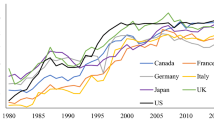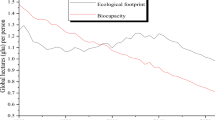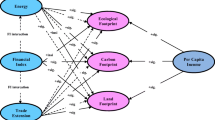Abstract
In recent years, many empirical studies investigated the effects of globalization on the ecological footprint (EF). Most of these studies relied on the KOF index of globalization and studied the effects of total globalization and disaggregated impacts of economic, social, and political globalization on the EF. However, less attention has been given to financial globalization which can also influence the EF. Hence, this study investigates the association between financial globalization (FG), economic growth (GDP), and EF controlling population density (PD) in the selected West Asian and the Middle East (WAME) nations from 1990 to 2017. The study relied upon second-generation methods for checking stationary properties and Westerlund and other techniques to scrutinize cointegration. The evidence showed cointegration in the model. The long-run approximations from continuously updated fully modified (CUP-FM) and continuously updated bias corrected (CUP-BC) tests divulge that financial globalization is an important factor to promote ecological sustainability in the sample countries because it decreases EF. Population density exacerbates EF and worsens environmental deterioration in sample countries. The study detected the environmental Kuznets curve (EKC) between EF and economic growth in the presence of financial globalization and population density. Besides, financial globalization Granger causes EF, while the feedback effect exists between EF and economic growth. Based on these results, WAME economies can accomplish ecological sustainability and sustainable development by enhancing their financial globalization levels.

Similar content being viewed by others
References
Adebayo TS, Kirikkaleli D (2021) Impact of renewable energy consumption, globalization, and technological innovation on environmental degradation in Japan: application of wavelet tools. Environ Dev Sustain:1–26
Adebayo TS, Awosusi AA, Kirikkaleli D, Akinsola GD, Mwamba MN (2021) Can CO 2 emissions and energy consumption determine the economic performance of South Korea? A time series analysis. Environ Sci Pollut Res:1–16
Adedoyin FF, Alola AA, Bekun FV (2020) An assessment of environmental sustainability corridor: the role of economic expansion and research and development in EU countries. Sci Total Environ 713:136726. https://doi.org/10.1016/j.scitotenv.2020.136726
Ahmad M, Ahmed Z, Majeed A, Huang B (2021a) An environmental impact assessment of economic complexity and energy consumption : does institutional quality make a difference? Environ Impact Assess Rev 89:106603. https://doi.org/10.1016/j.eiar.2021.106603
Ahmad M, Jiang P, Murshed M et al (2021b) Modelling the dynamic linkages between eco-innovation, urbanization, economic growth and ecological footprints for G7 countries: does financial globalization matter? Sustain Cities Soc 102881
Ahmed Z, Le HP (2020) Linking information communication technology, trade globalization index, and CO2 emissions: evidence from advanced panel techniques. Environ Sci Pollut Res 28:8770–8781. https://doi.org/10.1007/s11356-020-11205-0
Ahmed K, Long W (2013) An empirical analysis of CO2 emission in Pakistan using EKC hypothesis. J Int Trade Law Policy 12:188–200. https://doi.org/10.1108/JITLP-10-2012-0015
Ahmed Z, Wang Z (2019) Investigating the impact of human capital on the ecological footprint in India: an empirical analysis. Environ Sci Pollut Res 26:26782–26796. https://doi.org/10.1007/s11356-019-05911-7
Ahmed Z, Wang Z, Mahmood F, Hafeez M, Ali N (2019) Does globalization increase the ecological footprint? Empirical evidence from Malaysia. Environ Sci Pollut Res 26:18565–18582. https://doi.org/10.1007/s11356-019-05224-9
Ahmed Z, Asghar MM, Malik MN, Nawaz K (2020a) Moving towards a sustainable environment: the dynamic linkage between natural resources, human capital, urbanization, economic growth, and ecological footprint in China. Res Policy 67:101677. https://doi.org/10.1016/j.resourpol.2020.101677
Ahmed Z, Zafar MW, Mansoor S (2020b) Analyzing the linkage between military spending, economic growth, and ecological footprint in Pakistan: evidence from cointegration and bootstrap causality. Environ Sci Pollut Res 27:41551–41567. https://doi.org/10.1007/s11356-020-10076-9
Ahmed Z, Cary M, Le HP (2021a) Accounting asymmetries in the long-run nexus between globalization and environmental sustainability in the United States: an aggregated and disaggregated investigation. Environ Impact Assess Rev 86:106511. https://doi.org/10.1016/j.eiar.2020.106511
Ahmed Z, Cary M, Shahbaz M, Vo XV (2021b) Asymmetric nexus between economic policy uncertainty, renewable energy technology budgets, and environmental sustainability: evidence from the United States. J Clean Prod 313:127723. https://doi.org/10.1016/j.jclepro.2021.127723
Ahmed Z, Zhang B, Cary M (2021c) Linking economic globalization, economic growth, financial development, and ecological footprint: evidence from symmetric and asymmetric ARDL. Ecol Indic 121:107060. https://doi.org/10.1016/j.ecolind.2020.107060
Almeida E, Carvalho TS (2009) The global environmental Kuznets curve and the Kyoto Protocol. 35. http://citeseerx.ist.psu.edu/viewdoc/summary?doi=10.1.1.510.2949&rank=1
Al-Mulali U, Weng-Wai C, Sheau-Ting L, Mohammed AH (2015) Investigating the environmental Kuznets curve (EKC) hypothesis by utilizing the ecological footprint as an indicator of environmental degradation. Ecol Indic 48:315–323. https://doi.org/10.1016/j.ecolind.2014.08.029
Al-Mulali U, Solarin SA, Ozturk I (2016) Investigating the presence of the environmental Kuznets curve (EKC) hypothesis in Kenya: an autoregressive distributed lag (ARDL) approach. Nat Hazards 80:1729–1747. https://doi.org/10.1007/s11069-015-2050-x
Alola AA, Bekun FV, Sarkodie SA (2019) Dynamic impact of trade policy, economic growth, fertility rate, renewable and non-renewable energy consumption on ecological footprint in Europe. Sci Total Environ 685:702–709. https://doi.org/10.1016/j.scitotenv.2019.05.139
Awosusi AA, Adebayo TS, Ramzan M, Iqbal HA, Akinsola GD (2021) The environmental sustainability effects of financial development and urbanization in Latin American countries. Environ Sci Pollut Res:1–14
Bai J, Kao C, Ng S (2009) Panel cointegration with global stochastic trends. J Econ 149:82–99. https://doi.org/10.1016/j.jeconom.2008.10.012
Bekun FV, Adebayo TS, Akinsola GD, Kirikkaleli D, Umarbeyli S, Osemeahon OS (2021) Economic performance of Indonesia amidst CO 2 emissions and agriculture: a time series analysis. Environ Sci Pollut Res:1–15
Bello MO, Solarin SA, Yen YY (2018) The impact of electricity consumption on CO2 emission, carbon footprint, water footprint and ecological footprint: the role of hydropower in an emerging economy. J Environ Manag 219:218–230. https://doi.org/10.1016/j.jenvman.2018.04.101
British Petroleum (2019) Statistical review of world energy 2019, available at https://www.bp.com/en/global/corporate/energy-economics/statistical-review-of-world-energy.html (Accessed January, 2021)
Can M, Ahmed Z, Mercan M, Kalugina OA (2021) The role of trading environment-friendly goods in environmental sustainability: does green openness matter for OECD countries ? J Environ Manag 295:113038. https://doi.org/10.1016/j.jenvman.2021.113038
Charfeddine L (2017) The impact of energy consumption and economic development on ecological footprint and CO2 emissions: evidence from a Markov switching equilibrium correction model. Energy Econ 65:355–374. https://doi.org/10.1016/j.eneco.2017.05.009
Charfeddine L, Mrabet Z (2017) The impact of economic development and social-political factors on ecological footprint : a panel data analysis for 15 MENA countries. Renew Sust Energ Rev 76:138–154. https://doi.org/10.1016/j.rser.2017.03.031
Chishti MZ, Ahmed Z, Murshed M, Namkambe HH, Ulucak R (2021) The asymmetric associations between foreign direct investment inflows, terrorism, CO2 emissions, and economic growth: a tale of two shocks. Environ Sci Pollut Res. https://doi.org/10.1007/s11356-021-15188-4
Coelho MF, Onbaşıoğlu DÇ, Rjoub H, Mata MN, Adebayo TS, Carvalho PV, Adeshola I (2021) Modeling the Dynamic Linkage between Renewable Energy Consumption, Globalization, and Environmental Degradation in South Korea: Does Technological Innovation Matter? Energies 14(14):4265
Danish BMA, Mahmood N, Zhang JW (2019) Effect of natural resources, renewable energy and economic development on CO2 emissions in BRICS countries. Sci Total Environ 678:632–638. https://doi.org/10.1016/j.scitotenv.2019.05.028
Destek MA, Okumus I (2019) Does pollution haven hypothesis hold in newly industrialized countries? Evidence from ecological footprint. Environ Sci Pollut Res 26:23689–23695. https://doi.org/10.1007/s11356-019-05614-z
Destek MA, Sarkodie SA (2019) Investigation of environmental Kuznets curve for ecological footprint: the role of energy and financial development. Sci Total Environ 650:2483–2489. https://doi.org/10.1016/j.scitotenv.2018.10.017
Dinda S (2004) Environmental Kuznets curve hypothesis: a survey. Ecol Econ 49:431–455. https://doi.org/10.1016/j.ecolecon.2004.02.011
Dogan E, Ulucak R, Kocak E, Isik C (2020) The use of ecological footprint in estimating the environmental Kuznets curve hypothesis for BRICST by considering cross-section dependence and heterogeneity. Sci Total Environ 723:138063. https://doi.org/10.1016/j.scitotenv.2020.138063
Dreher A (2006) Does globalization affect growth? Evidence from a new index of globalization. Appl Econ 38:1091–1110. https://doi.org/10.1080/00036840500392078
Dumitrescu EI, Hurlin C (2012) Testing for Granger non-causality in heterogeneous panels. Econ Model 29:1450–1460. https://doi.org/10.1016/j.econmod.2012.02.014
Erdoğan S, Yıldırım DÇ, Gedikli A (2020) Natural resource abundance, financial development and economic growth: an investigation on Next-11 countries. Res Policy 65:101559. https://doi.org/10.1016/j.resourpol.2019.101559
GFN (2021) Global footprint network data. https://data.footprintnetwork.org/#/countryTrends?cn=165&type=BCpc,EFCpc (Accessed Januray 17, 2021)
Grossman GM, Krueger AB (1995) Economic growth and the environment. Q J Econ 110:353–377
Gygli S, Haelg F, Potrafke N, Sturm JE (2019) The KOF globalisation index – revisited. Rev Int Organ 14:543–574. https://doi.org/10.1007/s11558-019-09344-2
Han Y, Zhang F, Huang L, Peng K, Wang X (2021) Does industrial upgrading promote eco-efficiency?—a panel space estimation based on Chinese evidence. Energy Policy 154:112286. https://doi.org/10.1016/j.enpol.2021.112286
Hassan ST, Xia E, Khan NH, Shah SMA (2019) Economic growth, natural resources, and ecological footprints: evidence from Pakistan. Environ Sci Pollut Res 26:2929–2938. https://doi.org/10.1007/s11356-018-3803-3
Hassan ST, Danish KSUD et al (2020) Role of institutions in correcting environmental pollution: an empirical investigation. Sustain Cities Soc 53:101901. https://doi.org/10.1016/j.scs.2019.101901
He X, Adebayo TS, Kirikkaleli D, Umar M (2021) Consumption-based carbon emissions in Mexico: an analysis using the dual adjustment approach. Sustain Prod Consum 27:947–957
Işık C, Ongan S, Özdemir D (2019) Testing the EKC hypothesis for ten US states: an application of heterogeneous panel estimation method. Environ Sci Pollut Res 26:10846–10853. https://doi.org/10.1007/s11356-019-04514-6
Jaforullah M, King A (2017) The econometric consequences of an energy consumption variable in a model of CO2 emissions. Energy Econ 63:84–91. https://doi.org/10.1016/j.eneco.2017.01.025
Katircioglu S, Gokmenoglu KK, Eren BM (2018) Testing the role of tourism development in ecological footprint quality: evidence from top 10 tourist destinations. Environ Sci Pollut Res 25:33611–33619. https://doi.org/10.1007/s11356-018-3324-0
Kihombo S, Ahmed Z, Chen S, Adebayo TS, Kirikkaleli D (2021a) Linking financial development, economic growth, and ecological footprint: what is the role of technological innovation? Environ Sci Pollut Res:1–11. https://doi.org/10.1007/s11356-021-14993-1
Kihombo S, Saud S, Ahmed Z, Chen S (2021b) The effects of research and development and financial development on CO2 emissions: evidence from selected WAME economies. Environ Sci Pollut Res. https://doi.org/10.1007/s11356-021-14288-5
Kirikkaleli D, Adebayo TS (2020) Do renewable energy consumption and financial development matter for environmental sustainability? New global evidence. Sustainable Development
Kirikkaleli D, Adebayo TS (2021) Do public-private partnerships in energy and renewable energy consumption matter for consumption-based carbon dioxide emissions in India? Environ Sci Pollut Res: 1-14
Li J, Hu Z, Shi V, Wang Q (2021a) Manufacturer’s encroachment strategy with substitutable green products. Int J Prod Econ 235:108102. https://doi.org/10.1016/j.ijpe.2021.108102
Li X, Li Z, Jia T, Yan P, Wang D, Liu G (2021) The sense of community revisited in Hankow, China: Combining the impacts of perceptual factors and built environment attributes. Cities 111
Li X, Zhang C, Zhang B, Wu D, Shi Y, Zhang W, Ye Q, Yan J, Fu J, Fang C, Ha D, Fu S (2021b) Canopy and understory nitrogen addition have different effects on fine root dynamics in a temperate forest: implications for soil carbon storage. New Phytol 231:1377–1386. https://doi.org/10.1111/nph.17460
Li X, Zhang C, Zhang B, Wu D, Zhu D, Zhang W, Ye Q, Yan J, Fu J, Fang C, Ha D, Fu S (2021c) Nitrogen deposition and increased precipitation interact to affect fine root production and biomass in a temperate forest: implications for carbon cycling. Sci Total Environ 765:144497. https://doi.org/10.1016/j.scitotenv.2020.144497
Magazzino C, Cerulli G (2019) The determinants of CO2 emissions in MENA countries: a responsiveness scores approach. Int J Sustain Dev World Ecol 26:522–534. https://doi.org/10.1080/13504509.2019.1606863
Malik MY, Latif K, Khan Z, Butt HD, Hussain M, Nadeem MA (2020) Symmetric and asymmetric impact of oil price, FDI and economic growth on carbon emission in Pakistan: evidence from ARDL and non-linear ARDL approach. Sci Total Environ 110669:138421. https://doi.org/10.1016/j.scitotenv.2020.138421
Mata MN, Adebayo TS, Coelho MF, Onbaşıoğlu DÇ, Rjoub H, Carvalho PV, Adeshola I (2021) Modeling the dynamic linkage between renewable energy consumption, globalization, and environmental degradation in South Korea: does technological innovation matter? Energies 14(14):4265
Mrabet Z, AlSamara M, Hezam Jarallah S (2017) The impact of economic development on environmental degradation in Qatar. Environ Ecol Stat 24:7–38. https://doi.org/10.1007/s10651-016-0359-6
Murshed M, Ahmed Z, Alam MS et al (2021a) Reinvigorating the role of clean energy transition for achieving a low-carbon economy: evidence from Bangladesh. Environ Sci Pollut Res:1–22
Murshed M, Elheddad M, Ahmed R, Bassim M, Than ET (2021b) Foreign direct investments, renewable electricity output, and ecological footprints: do financial globalization facilitate renewable energy transition and environmental welfare in Bangladesh? Asia-Pacific Financ Mark. https://doi.org/10.1007/s10690-021-09335-7
Narayan PK, Narayan S (2010) Carbon dioxide emissions and economic growth: panel data evidence from developing countries. Energy Policy 38:661–666. https://doi.org/10.1016/j.enpol.2009.09.005
Oladipupo SD, Adebayo TS, Awosusi AA, Agyekum EB, Jayakumar A, Kumar NM (2021) Dominance of fossil fuels in Japan’s national energy mix and implications for environmental sustainability. Int J Environ Res Public Health 18(14):7347
Orhan A, Adebayo TS, Genç SY, Kirikkaleli D (2021) Investigating the linkage between economic growth and environmental sustainability in India: do agriculture and trade openness matter? Sustainability 13(9):4753
Ozcan B, Apergis N, Shahbaz M (2018) A revisit of the environmental Kuznets curve hypothesis for Turkey: new evidence from bootstrap rolling window causality. Environ Sci Pollut Res 25:32381–32394. https://doi.org/10.1007/s11356-018-3165-x
Pedroni P (1999) Critical values for cointegration tests in heterogeneous panels with multiple regressors. Oxf Bull Econ Stat 61:653–670. https://doi.org/10.1111/1468-0084.61.s1.14
Pesaran MH (2007) A simple panel unit root test in the presence of cross section dependence. J Appl Econ 47:265–312. https://doi.org/10.1002/jae
Phillips PCB, Hansen BE (1990) Statistical inference in instrumental variables regression with I (1) processes. Rev Econ Stud 57:99–125
Quan Q, Gao S, Shang Y, Wang B (2021) Assessment of the sustainability of Gymnocypris eckloni habitat under river damming in the source region of the Yellow River. Sci Total Environ 778:146312. https://doi.org/10.1016/j.scitotenv.2021.146312
Rahman MM (2017) Do population density, economic growth, energy use and exports adversely affect environmental quality in Asian populous countries? Renew Sust Energ Rev 77:506–514. https://doi.org/10.1016/j.rser.2017.04.041
Rauf A, Liu X, Amin W, Ozturk I, Rehman OU, Hafeez M (2018) Testing EKC hypothesis with energy and sustainable development challenges: a fresh evidence from belt and road initiative economies. Environ Sci Pollut Res 25:32066–32080. https://doi.org/10.1007/s11356-018-3052-5
Sarkodie SA (2018) The invisible hand and EKC hypothesis: what are the drivers of environmental degradation and pollution in Africa? Environ Sci Pollut Res 25:21993–22022. https://doi.org/10.1007/s11356-018-2347-x
Saud S, Chen S, Haseeb A et al (2019) The nexus between financial development, income level, and environment in Central and Eastern European countries: a perspective on Belt and Road Initiative. Environ Sci Pollut Res 26:2253–2269. https://doi.org/10.1007/s11356-018-3688-1
Shahbaz M, Mutascu M, Azim P (2014) Environmental Kuznets curve in Romania and the role of energy consumption. Renew Sust Energ Rev 18:165–173. https://doi.org/10.1016/j.rser.2012.10.012
Shahbaz M, Solarin SA, Hammoudeh S, Shahzad SJH (2017) Bounds testing approach to analyzing the environment Kuznets curve hypothesis with structural beaks: the role of biomass energy consumption in the United States. Energy Econ 68:548–565. https://doi.org/10.1016/j.eneco.2017.10.004
Shahbaz M, Shahzad SJH, Mahalik MK, Hammoudeh S (2018) Does globalisation worsen environmental quality in developed economies? Environ Model Assess 23:141–156. https://doi.org/10.1007/s10666-017-9574-2
Shan S, Ahmad M, Tan Z, Adebayo TS, Li RYM, Kirikkaleli D (2021) The role of energy prices and non-linear fiscal decentralization in limiting carbon emissions: Tracking environmental sustainability. Energy 234
Soylu ÖB, Adebayo TS, Kirikkaleli D (2021) The imperativeness of environmental quality in China amidst renewable energy consumption and trade openness. Sustainability 13(9):5054
Tufail M, Song L, Adebayo TS, Kirikkaleli D, Khan S (2021) Do fiscal decentralization and natural resources rent curb carbon emissions? Evidence from developed countries. Environ Sci Pollut Res:1–12
Uddin GA, Salahuddin M, Alam K, Gow J (2017) Ecological footprint and real income: panel data evidence from the 27 highest emitting countries. Ecol Indic 77:166–175. https://doi.org/10.1016/j.ecolind.2017.01.003
Udemba EN, Ahmed Z, Adebayo TS, Kirikkaleli D (2021) Determinants of consumption-based carbon emissions in Chile: an application of non-linear ARDL. Environ Sci Pollut Res:1–15
Ulucak R, Bilgili F (2018) A reinvestigation of EKC model by ecological footprint measurement for high, middle and low income countries. J Clean Prod 188:144–157. https://doi.org/10.1016/j.jclepro.2018.03.191
Ulucak ZŞ, İlkay SÇ, Özcan B, Gedikli A (2020) Financial globalization and environmental degradation nexus: evidence from emerging economies. Res Policy 67:101698. https://doi.org/10.1016/j.resourpol.2020.101698
Wang Y, Kang L, Wu X, Xiao Y (2013) Estimating the environmental Kuznets curve for ecological footprint at the global level: a spatial econometric approach. Ecol Indic 34:15–21. https://doi.org/10.1016/j.ecolind.2013.03.021
Wang KH, Liu L, Adebayo TS, Lobon OR, Claudia MN (2021) Fiscal decentralization, political stability and resources curse hypothesis: a case of fiscal decentralized economies. Res Policy 72:102071
Westerlund J (2007) Testing for error correction in panel data. Oxf Bull Econ Stat 69:709–748. https://doi.org/10.1111/j.1468-0084.2007.00477.x
Wu B, Jin C, Monfort A, Hua D (2021) Generous charity to preserve green image? Exploring linkage between strategic donations and environmental misconduct. J Bus Res 131:839–850. https://doi.org/10.1016/j.jbusres.2020.10.040
Yuping L, Ramzan M, Xincheng L, Murshed M, Awosusi AA, BAH, S. I., & Adebayo, T. S. (2021) Determinants of carbon emissions in Argentina: The roles of renewable energy consumption and globalization. Energy Rep 7:4747–4760
Zafar MW, Shahbaz M, Hou F, Sinha A (2019) From nonrenewable to renewable energy and its impact on economic growth: the role of research & development expenditures in Asia-Pacific Economic Cooperation countries. J Clean Prod 212:1166–1178. https://doi.org/10.1016/j.jclepro.2018.12.081
Zaidi SAH, Zafar MW, Shahbaz M, Hou F (2019) Dynamic linkages between globalization, financial development and carbon emissions: evidence from Asia Pacific Economic Cooperation countries. J Clean Prod 228:533–543. https://doi.org/10.1016/j.jclepro.2019.04.210
Zhang L, Li Z, Kirikkaleli D, Adebayo TS, Adeshola I, Akinsola GD (2021) Modeling CO2 emissions in Malaysia: an application of Maki cointegration and wavelet coherence tests. Environ Sci Pollut Res 28(20):26030–26044
Zhao X, Gu B, Gao F, Chen S (2020) Matching model of energy supply and demand of the integrated energy system in coastal areas. J Coast Res 103:983–989. https://doi.org/10.2112/SI103-205.1
Availability of data and material
Data sources and relevant links are provided in the paper to access data.
Funding
Innovative Research Group Project of the National Natural Science Foundation of China (NSFC-71972011, 71672009) under the supervision of the corresponding author (Professor Dr. Songsheng Chen).
Author information
Authors and Affiliations
Contributions
SK: writing original manuscript, conceptualization, writing review and editing. AV: writing original manuscript, data collection. ZA: formal analysis, methodology, writing original manuscript, writing review and editing. SC: reviewed, supervision, corrected mistakes, funding provision. DK: administration, writing review and editing. TA: validation, writing review and editing.
Corresponding authors
Ethics declarations
Ethics approval and consent to participate
NA
Consent for publication
NA
Competing interests
The authors declare no competing interests.
Additional information
Responsible Editor: Nicholas Apergis
Publisher’s note
Springer Nature remains neutral with regard to jurisdictional claims in published maps and institutional affiliations.
Rights and permissions
About this article
Cite this article
Kihombo, ., Vaseer, A.I., Ahmed, Z. et al. Is there a tradeoff between financial globalization, economic growth, and environmental sustainability? An advanced panel analysis. Environ Sci Pollut Res 29, 3983–3993 (2022). https://doi.org/10.1007/s11356-021-15878-z
Received:
Accepted:
Published:
Issue Date:
DOI: https://doi.org/10.1007/s11356-021-15878-z




